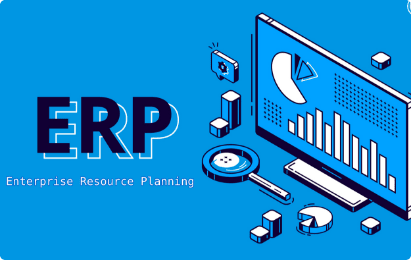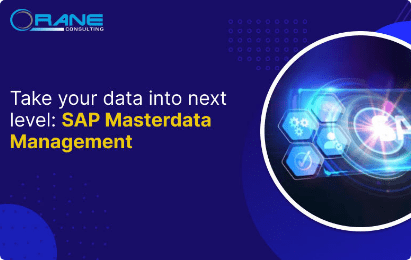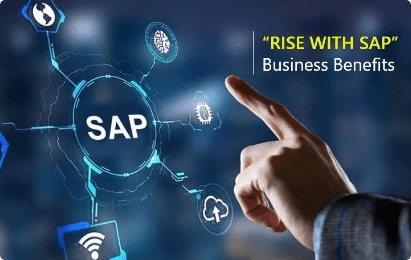
Blog
Orane’s blog posts keeping you up to speed with what’s hot in the world of business.
Why your SAP ERP must Integrate with your other Business Processes

Introduction:
In a market that is driven by VUCA (Volatility, Uncertainty, Complexity, and Ambiguity), organizations are constantly identifying avenues to stay agile, informed, and ahead of the curve.
ERP (Enterprise Resource Planning) systems, in this regard, have been faithful enterprise allies that help drive a competitive edge, especially as globalization squeezes the market in most sectors and across industries.
ERP systems are crucial for the complex enterprise of today as they help in managing the many business functions within an integrated and centralized system. They are:
1.Provide clear and deep visibility into organizational information
2.Allow departments to work with the same information
3.Help in creating a single version of the truth
4.Assist in managing their business functions with ease and efficiency.
Given the benefits that ERP systems bring to the table that market is poised to reach $78.40 billion by 2026.
SAP ERP is one of the leading enterprise resource planning tools. However, for it to deliver on its true value, SAP ERP must integrate seamlessly with all other business applications at play in the organization’s universe.
Here are some of the compelling reasons why this is so.
Business Agility
Today’s organizations are dependent on multiple stand-alone applications to manage different processes. As the organization grows the number of applications and processes also increases. Managing all these applications individually and mitigating their needs can be challenging when everything moves as an independent being in a large organizational galaxy. Managing these disparate applications become time-consuming and messy, especially as a business expands.
Given this complexity, organizations have to make sure that they employ an ERP system to access accurate information regarding the business and its functions. However, this ERP system will only be able to deliver value if it integrates seamlessly with all the other business applications. Failing to integrate SAP ERP with these can result in reduced business agility owing to inconsistent and incomplete data and lower visibility into business information. This outcome is quite contrary to the benefits as promised by ERP systems.
Enhanced Data Accuracy
Integrating SAP ERP with other applications and systems is crucial to improve their overall accuracy and to increase operational efficiency. A lack of integration means that data resides in silos and that this data has to be separately fed (usually, manually) into the ERP.
Error-prone data or data inconsistencies, in such a case, become common and result in departments working with incorrect information. This can lead to an avalanche of other issues and can finally snowball into customer dissatisfaction and/or dropouts.
An integrated SAP ERP system takes care of these inaccuracies and makes sure that data is consistent and available at all times.
Positive Impact on Collaboration and Business Revenue
Disintegrated systems mean more reliance on manual data updates which eventually impacts the speed at which data gets transferred into an ERP system. These delays impact the speed of business and, consequently, business outcomes. This is so because it hampers team collaboration and impedes the ability of teams to work towards the same objective with intensity and without conflict.
This is counter-productive to business revenue as in the absence of ERP integration teams spend valuable time going back and forth between one another.
Flexibility and Customization
With SAP ERP integrated with all other business applications, organizations get the opportunity to streamline, customize, and automate workflows with great flexibility. A fully integrated system will make sure that all workflows are optimized, and that valuable organizational resources are being utilized productively.
Dependent on the business needs, organizations can then build workflows, allocate or remove resources, and work towards developing better and well-informed growth strategies and improve workflow efficiencies instead of working on endless workflow patch-ups.
Streamlined Processes
SAP ERP, one of the most widely used ERP solutions today, helps organizations manage critical business functions like those of finance and accounting, human capital management, enterprise performance management, supplier relationship management, and others.
However, SAP implementation is incomplete without integration with both SAP and non-SAP applications such as supplier systems, CRM applications, Third Party Purchase Order Systems, and the like. In its absence, automating and optimizing processes and revenue becomes a challenge.
Thus, it is imperative to get an implementation and integration partner who understands the complexities at play. The partner should be able to build meaningful connections between systems and applications, have the right domain knowledge to build the right workflows and processes, and ensure a sophisticated data mapping process. They have to facilitate proper data management and also build secure and strong connections and customizations while following robust and fool-proof ERP integration best practices.
The analogy “united we stand, divided we fall” resonates well in this scenario. Integration ensures centralized data, better information, reduced silos, automated processes, improved workflow visualization, reduced human error, and more time to invest in labor-intensive processes. With the right integrations in place, organizations can then enable the employee, customer, and consequently, business success.
Subscribe to our communication
You agree to receive newsletters, marketing communication and latest developments from us.

6 Tips to Boost Your Business Performance
- August 19, 2022

How ERP Implementation is Essential for Businesses? – Top 5 Reasons
- August 19, 2022

Take your Data into next level
- August 19, 2022

Rise with SAP: Business Benefits
- August 19, 2022

SAP Masterdata Management
- August 19, 2022

